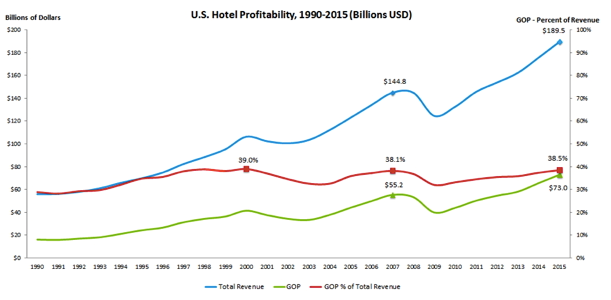By Pierre Boettner
What hotel owner or GM could be blamed for sleeping a little more soundly after seeing a chart like this? Hotels are at the top of the mountain after years of clawing profits back up from the economic crash of 2009. All amidst the rising cost of doing business with OTAs and rapidly increasing supply. There’s a lot to be thankful for. And there’s a lot to do because we all know the way economics works, and when you’re at the top of the mountain, you can either plateau or start hiking downward.
Controlling costs and expenses is one of two ways hotels have of increasing profit margins, which are among the tightest of any industry. Often in the past, hoteliers cut rates in order to increase gross revenue, but this comes at the high cost of reducing profitability per booking. With rooms bringing in 68.1% of total operating revenue, according to the 2016 edition of Trends® in the Hotel Industry (far more for limited service hotels), any impact to rooms revenue can have a staggering effect.
CBRE‘s Robert Mandelbaum and Gary McDade note that “Even more impressive than the contribution of rooms revenue to total revenue, is the influence of the rooms department on hotel profitability… In short, as the rooms department goes, so goes the hotel.” We’ve put a lot of energy into revenue management, the front end of room’s division profitability, but what about the losses that happen thereafter? We don’t speak to those very often. We talk about efficiencies—doing more with the same amount of resources—but we don’t address the leaks. Maybe it’s because we don’t know where the leaks are. It’s not that we don’t care about losing money as much as it is that we don’t know how, or where, or even that we’re losing it.
Here’s what to consider about identifying and rectifying losses in the rooms division.
Tracking
It’s easy to identify a problem when housekeeping is taking as long on a stay-over as on a turnover day. You can see this problem, count the minutes, and then resolve the issue. It’s trackable, and thank goodness, because this is a leak that adds up quickly when you multiply by a few hundred rooms each day.
Consider your rooms, however. Are you able to track the way that guests are checked into their rooms? Are you able to see if an alternative was available yesterday at 3 p.m. when your front desk agent didn’t have a Deluxe available for a confirmed guest and, instead, booked them into a Standard room? Are you able to uncover why the requested Deluxe room wasn’t available? (Were other guests upgraded during the previous days causing the impasse? Was there an alternative to downgrading the guest when she was checked in?). Tracking rooms is maybe the most fundamental strategy toward identifying room’s division losses because these losses are occurring every single day and they can amount to a substantial amount.
Standards Let’s say that half of guests are putting shampoo bottles in their bags when they arrive, and housekeeping is bringing fresh ones every day. A leak. Some will suggest that you can save money on shampoo by installing a dispenser. However, then there’s your branding to consider? Do your guests really want a shampoo dispenser in the shower? That’s the thing about fixing the leaks. You must maintain—or improve, whenever possible—your standards while plugging the drain.
The same goes for solving problems with guests by upgrading. The front desk should have it top-of-mind that rooms are not a free solution to a guest complaint. They should also be able to see with crystal clarity that the upgrade they are offering a guest is reserved tomorrow or the following day. Too many complimentary upgrades become losses not so much because they would have been reserved at the last minute (though this does happen), but because they are affecting reservations for days out.
Monetize
What about those rooms with balconies? Your rooms have beautiful views, and it’s a quiet neighborhood (these things are quantifiable), but you’re giving balcony rooms away pell-mell to guests who may or may not care for one when there are guests who would have paid extra for it. When you don’t take advantage of your assets, you are losing money. Take stock of your property and sell your features.
A while back I came across an article about the top ten ways hotels are losing money. Only one of them—just 10% of the list—had to do with the rooms division, and it was about laundry. “As rooms go, so goes the hotel,” so why aren’t we figuring out where the problems are in rooms? Because we don’t know how (at least, not until recently. Read about that here.)
If you don’t know what is happening in the most fundamental product delivery of your hotel, chances are you’re losing money. These losses will become make-or-break in the near future despite the fact that the hotel industry is performing at record levels. Expense growth (4%) is outpacing revenue growth (2-3%), and the most considerable expense at any hotel is labor, most of which falls under rooms. Better training in the rooms division, creating awareness of the compound effects of their daily decisions, along with better tracking technology can close some of this expense gap and recoup profits due to unknown leaks in the most important revenue-generating department on property.


